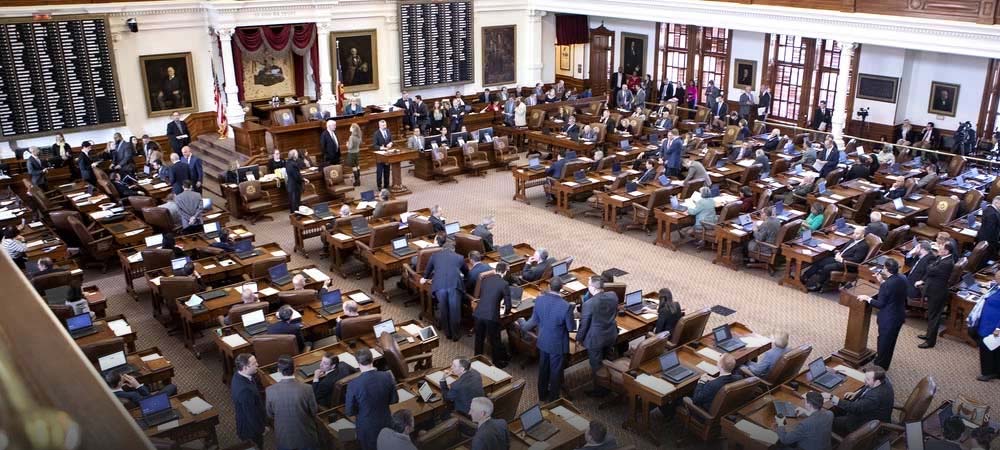- Senator Carol Alvarado filed TX SJR 17 for the 2023 legislative session.
- The measure focused on casino gambling expansion, but explicitly includes sports wagering.
- The bill must first see approval in the legislature before earning a two-thirds vote on the November 2023 ballot.
AUSTIN, Texas – Texas Senator Carol Alvarado filed a gambling expansion bill in Texas on Monday.
While the bill puts an emphasis on “the strict regulation of casino gaming“, it also lays out abilities for a newly created commission to begin the sports wagering process.
Alvarado’s bill, TX SJR 17, would see the Texas Gaming Commission formed assuming it is also approved as a constitutional amendment in November 2023.
What’s In The Bill?
TX SJR 17 doesn’t include too much surrounding legal Texas sports betting. But, the end of the bill explains how the general public would see the ballot measure.
“The constitutional amendment to foster economic development and job growth and to provide tax relief and funding for education and public safety by creating the Texas Gaming Commission, authorizing casino gaming at a limited number of destination resorts and facilities licensed by the commission, and authorizing sports wagering.”
Whether the state would see Texas sportsbooks online or in person is uncertain. But, one could assume from the wording that Texas will focus on a land-based sports betting venture. Defining class levels of casino gaming in SJR 17, Texas sports betting could look something like this if it follows suit:
- Class I: Four casino gambling destination resorts within a metropolitan area of more than two million people.
- Class II: Three current or active greyhound tracks within a metropolitan area of more than two million people.
- Class III: Two current or active greyhound tracks within a metropolitan area of less than two million people.
- Tribal: Allows any tribe to operate slot machines or casino gaming on its Indian land.
Currently, two tribal casinos in Texas exist in Livingston and Eagle Pass. But there are no active casino destination resorts.
SJR 17 covers this, defining what qualified applicants would appear to be.
What A Texas Sportsbook Casino Resort Would Look Like
Without exacts on designs, the mindset toward legal sportsbooks in Texas at casino resorts is the play. The bill calls for a commitment to “building a destination resort with new total land and development investments of at least $1 billion.”
The cost increases to $2 billion in Dallas or Houston as they are “located in a metropolitan statistical area with an estimated population of five million or more”.
San Antonio and Austin are the two metropolitans between 2 and 5 million, with McAllen still over 1 million people behind from Class I status.
But here’s the kicker: the future Texas sportsbook casino resort “may not include public money or facilities developed or built with public assistance or tax incentives of any kind.”
Besides the development, Texas casino resorts will be judged on their total investment, job creation, experience, potential tax revenue, and more.
As far as tax benefits, 10% of gross gaming revenue from table games and 25% on slots would be taxed. There was no Texas sports betting tax rate listed in SJR 17.
Though advancing legal sports betting measures in Texas is rare, the process begins in January with a May 29 session end deadline.
Advertising Disclosure
In order to provide you with the best independent sports betting news and content LegalSportsBetting.com may receive a commission from partners when you make a purchase through a link on our site.
News tags: Austin | Carol Alvarado | Dallas | Eagle Pass | Houston | Livingston | McAllen | San Antonio | Texas

After spending time scouting college basketball for Florida State University under Leonard Hamilton and the University of Alabama under Anthony Grant, Michael started writing focused on NBA content. A graduate of both schools, he now covers legal sports betting bills, sports betting revenue data, tennis betting odds, and sportsbook reviews. Michael likes to play basketball, hike, and kayak when not glued to the TV watching midlevel tennis matches.


 Bitcoin Sports Betting Sites
Bitcoin Sports Betting Sites Best Online Sports Betting
Best Online Sports Betting Famous Sports Bettors
Famous Sports Bettors States With Legal Sports Betting
States With Legal Sports Betting Sports Betting Events
Sports Betting Events




